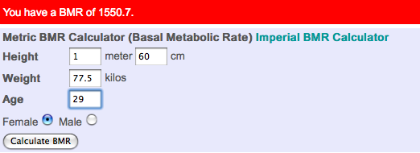We all use a certain amount of calories a day just by being alive. The number of calories you'd burn if you stayed in bed all day is called the Basal Metabolic Rate (BMR) and it is handy to have a rough idea of your BMR if you're trying to lose weight. Nowadays it's fairly easy to get an estimate of this, there are plenty of BMR calculators out there - like this one for instance.

It is important to know that this is just an estimate, as your BMR is influenced by many factors besides just age, gender and weight. If you have a thyroid problem for instance, your BMR would probably be lower, and if you have a lot of muscle mass it will be higher.
Anyways, as you can see, my BMR is around 1550 kcals a day. But since I don't stay in bed all day, my actual calorie expenditure will be higher. There's a formula called the Harris Benedict Equation, which you can use to estimate your actual expenditure, based on your BMR and your general activity level. There are also calculators that do both steps for you, like this one that I use, from CalorieCount. I picked "light activity" as my category since I am not sure if my daily walks to and from work (40 mins in total) and my daily 20DS session counts for more than that? Anyways I thought it would be better to underestimate my activity level. There was a slight difference in the number between using the formula (2,131 kcals) vs. using the calculator (2,030 kcals) - but it gives me a rough idea. I'm gonna use the average of the two, so approx. 2,080 kcals a day.
There are approximately 3500 calories in a pound of stored body fat. So, if you create a 3500-calorie deficit through diet, exercise or a combination of both, you will lose one pound of body weight. If you create a 7000 calorie deficit you will lose two pounds and so on. The calorie deficit can be achieved either by calorie-restriction alone, or by a combination of fewer calories in (diet) and more calories out (exercise).
Hence, if I want to lose a pound a week, my weekly calorie intake must be 3,500 kcals lower than my weekly calorie expenditure. Meaning each day I should eat 500 kcals less than I burn.
2,080 - 500 = 1580 kcals
Since I aim for a steady loss of between 0.5-1kg / 1-2 lbs a week I aim for a daily calorie intake of 1,400. I don't want to go much lower than that, because I don't want my body going into starvation mode - resulting in a lower BMR. Makes sense?
Goodness me it sounds so simple eh? We all know this. So why is it so darn hard to lose weight? Any spare willpower you have... you know where to send it!









No comments:
Post a Comment